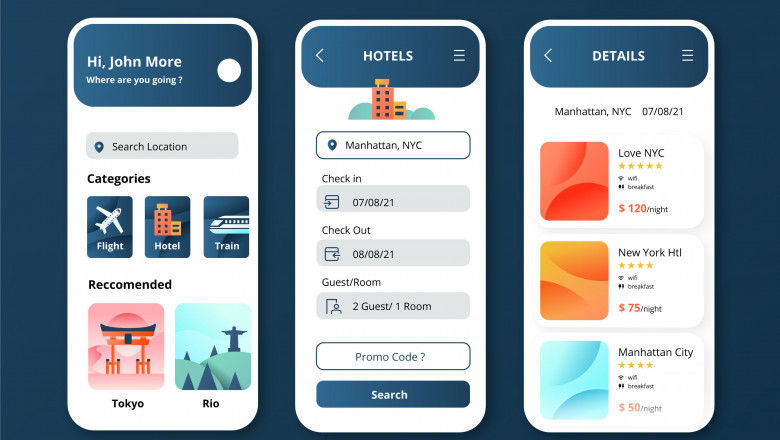views
In today’s fast-paced digital world, users expect mobile apps to be fast, responsive, and seamless. A high-performance mobile app not only enhances user experience but also improves retention rates, boosts engagement, and drives business growth. Whether you're building a startup app or an enterprise-level solution, following best practices is essential to ensure optimal performance.
At PerfectionGeeks, we specialize in high-performance mobile app development, helping businesses create apps that are not only feature-rich but also fast, scalable, and secure. In this blog, we’ll explore key best practices and strategies to build a high-performance mobile app that stands out in today’s competitive market.
1. Define Clear Goals & Understand User Needs
Before starting the development process, it’s crucial to have a clear vision of your app's objectives and understand your target audience.
Key Steps:
- Conduct market research to identify user pain points and expectations.
- Define your app’s core functionality and unique value proposition.
- Develop user personas to align the app with customer needs.
- Analyze competitor apps to learn from their strengths and weaknesses.
Why It Matters?
A well-defined strategy ensures your app solves real user problems and meets business goals efficiently.
2. Choose the Right Technology Stack
The choice of programming languages, frameworks, and tools plays a significant role in app performance. The right tech stack helps in reducing load times, ensuring smooth interactions, and improving scalability.
Recommended Technology Stack:
- Native App Development: Swift (iOS), Kotlin (Android) for best performance.
- Cross-Platform Development: Flutter, React Native for faster development and cost efficiency.
- Backend Development: Node.js, Python, Ruby on Rails for scalable server-side operations.
- Database: Firebase, PostgreSQL, MongoDB for quick data retrieval.
At PerfectionGeeks, we use the latest and most efficient technologies to ensure optimal app performance and user satisfaction.
3. Optimize App Performance from the Start
Best Practices for High Performance:
- Minimize HTTP Requests: Reduce unnecessary API calls and use caching techniques.
- Optimize Images & Videos: Use compressed formats (e.g., WebP, HEIF) to improve loading speed.
- Use Lazy Loading: Load content only when needed to enhance responsiveness.
- Reduce App Size: Minify code, remove redundant libraries, and optimize assets.
- Enable Caching: Store frequently accessed data locally to reduce server requests.
A well-optimized app delivers faster load times, ensuring users stay engaged and satisfied.
4. Ensure Seamless UI/UX Design
User experience (UX) and user interface (UI) play a major role in app success. A high-performance mobile app should be intuitive, visually appealing, and easy to navigate.
Key UI/UX Best Practices:
- Follow platform-specific design guidelines (Material Design for Android, Human Interface Guidelines for iOS).
- Use responsive design to ensure compatibility across multiple devices.
- Implement smooth animations without compromising performance.
- Keep navigation simple with easy-to-use menus and buttons.
- Reduce clutter and distractions to maintain a clean and efficient UI.
At PerfectionGeeks, our UI/UX designers focus on creating engaging and user-friendly interfaces that keep users coming back.
5. Implement Robust Security Measures
Security is critical for any mobile app, especially those handling user data, payments, and sensitive information. A high-performance app must also be a secure app.
Essential Security Measures:
- Use Data Encryption: Secure user data using AES-256 encryption.
- Enable Multi-Factor Authentication (MFA): Strengthen login security.
- Regular Security Audits: Identify and fix vulnerabilities proactively.
- Secure API Communications: Use OAuth 2.0 and SSL/TLS encryption for safe data transmission.
- Prevent SQL Injections & Cross-Site Scripting (XSS): Protect against cyber threats.
At PerfectionGeeks, we prioritize security-first development to ensure data protection and user trust.
6. Optimize for Speed & Efficiency
Users abandon slow apps. A fast-loading app ensures higher engagement and better user retention.
Performance Optimization Tips:
- Reduce app startup time to under 3 seconds.
- Optimize background processes to reduce battery drain.
- Implement server-side rendering for faster data processing.
- Use content delivery networks (CDN) to serve content quickly.
- Optimize memory usage to prevent crashes and slowdowns.
With our expertise, PerfectionGeeks delivers lightweight and high-speed apps for a smooth user experience.
7. Test Extensively Before Deployment
Testing is a crucial step in ensuring your app runs flawlessly across different devices and platforms.
Key Testing Strategies:
- Automated Testing: Use tools like Appium & Selenium to detect issues early.
- Performance Testing: Check app speed and responsiveness under different conditions.
- Security Testing: Identify vulnerabilities before launch.
- Usability Testing: Gather user feedback to improve UI/UX.
PerfectionGeeks follows a rigorous testing process to deliver apps that are bug-free, efficient, and reliable.
8. Plan for Continuous Updates & Maintenance
A high-performance mobile app is not a one-time project. Continuous updates, feature enhancements, and performance improvements are essential for long-term success.
Key Maintenance Strategies:
- Monitor app performance using analytics tools.
- Fix bugs and update security patches regularly.
- Introduce new features based on user feedback.
- Optimize codebase for improved efficiency.
At PerfectionGeeks, we offer post-launch support and maintenance services to ensure your app remains competitive and up-to-date.
Final Thoughts
Building a high-performance mobile app requires strategic planning, the right technology, and a focus on user experience. By following best practices such as choosing the right tech stack, optimizing performance, ensuring security, and continuous maintenance, businesses can create an app that delivers value and drives engagement.
At PerfectionGeeks, we specialize in end-to-end mobile app development, helping businesses build scalable, secure, and high-performing apps that stand out in the competitive market.














Comments
0 comment